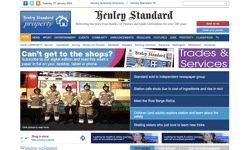
In coverage spanning local newspaper titles across the country, the sector is calling on Ministers to use the Mid Term Review to send a clear message to the BBC to change course on the ‘Across the UK’ plans.
One of the key considerations of the Mid-Term Review will be to evaluate how the BBC and Ofcom assess the market impact and public value of the BBC in an evolving marketplace and how that relates to the wider UK media ecology, including with regard to commercial radio and local news sectors.
Plans to inflict swingeing cuts on the corporation’s hugely popular local radio services, with the loss of many much-loved presenters, have prompted a public outcry. Instead, some of the money is to be diverted into boosting the BBC’s digital services, ramping up its provision of local news online to the detriment of the commercial local news sector.
Local publishers would be forced to compete with the might of licence fee-funded local news websites, taking audience and advertising revenues away from their own websites, despite Royal Charter requirements which are supposed to prevent the BBC damaging commercial providers in this way.
The local news media sector enjoys huge audiences – 40 million people (73 per cent of GB population aged 15+) now read local news media in print or digital every month. Trust in local journalism is rising too, with a recent survey finding that 81 per cent of Brits agree that they trust the news and information they see in their local news media – a rise of seven per cent on 2018.
But publishers fear a drain on digital advertising revenues caused by unfair competition with licence fee-funded local news websites could force some independent local news website to close, just as the industry is seeking to find a sustainable future for local journalism.
News Media Association chief executive Owen Meredith said: “The BBC’s unique status as a licence fee-funded news provider means that robust guardrails are required to protect the commercial news sector from being damaged by its activities.
“However, in the case of the ‘Across the UK’ plans, these guardrails have failed. The web is the modern newsstand, and the BBC has essentially put a free, taxpayer-funded newspaper on offer next to commercial competitors. We now need government to see what can be done to get the BBC to change course. Otherwise, we fear that local journalism will be irreparably harmed.”
Ian Carter, editorial director of Iliffe Media, said: “The problem lies with the BBC’s enormous and unique power - granted to the corporation by the licence fee - and the impact of this upon other news providers.
“We are always up for fair competition. Fair competition drives innovation and quality in many different sectors. But the BBC’s proposals are the exact opposite.
“Under the plans, online readers – and the commensurate advertising revenues which we use to pay our local journalists – will be sucked away from local media websites to the BBC’s.
“That pressure on our resources, at a time when we are grappling with a host of other challenges could cause some local titles around the country to call it a day. That would be a disaster for the communities affected.”
In an editorial in the Express and Star, editor Martin Wright added: “The local news sector believes in and values the contribution the BBC makes to our vibrant news ecosystem. But there is a real risk that the ‘Across the UK’ plans could wreak untold damage on our vibrant local journalism sector.
“We cannot allow that happen. With your help we can get the BBC to be a better neighbour to local commercial titles. That will ensure a vibrant and diverse local news sector for many years to come.”
Keep up-to-date with publishing news: sign up here for InPubWeekly, our free weekly e-newsletter.











